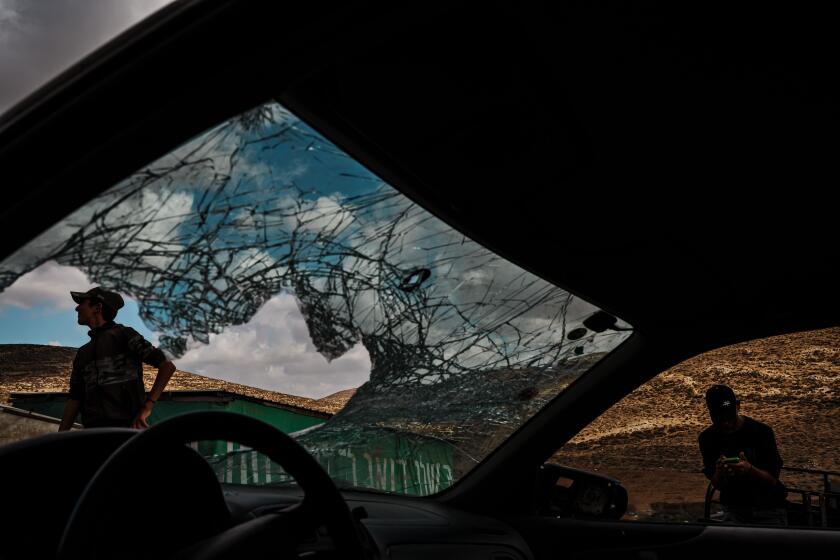News Analysis: What happens after the Israel-Hamas war ends? Two-state solution faces strong head winds

- Share via
TEL AVIV — When the Israel-Hamas war ends, the larger, decades-old issue of the Israeli-Palestinian conflict will remain festering, and, in the opinion of many, essential to resolve unless the cycle of death and destruction is to be repeated eternally.
Within the Biden administration, and among European allies and throughout the Arab world, the answer is straightforward. They view the two-state solution — the creation of an independent, sovereign Palestinian state existing alongside Israel, ending Israel’s occupation of Palestinian lands — as the only way to stop generations of violence that have stalked the region and killed tens of thousands of people to this day.
But straightforward it’s not. The number of Palestinians who have lost hope in achieving statehood is growing, according to opinion polls, especially as right-wing Jewish settlers have taken over swaths of Palestinian land. Support from some Arab governments has not always gone beyond lip service.
And Israeli Prime Minister Benjamin Netanyahu, his country’s longest serving leader, adamantly opposes establishment of a Palestinian state.
President Biden said the militant organization Hamas, whose massacre of Israelis on Oct. 7 triggered the current conflict, essentially shares Netanyahu’s goal — preventing the two-state solution.
‘We are surrounded,’ a Palestinian in the occupied West Bank says. Israeli settlers ‘come in uniforms so you can’t tell the difference between settler and soldier.’
“Hamas unleashed a terrorist attack because they fear nothing more than Israelis and Palestinians living side by side in peace,” Biden said. “To continue down the path of terror, violence, killing and war is to give Hamas what they seek. We can’t do that.”
Those are mighty head winds.
Shunning entreaties from the U.S., Netanyahu has announced that Israel will continue to barrage the Gaza Strip until Hamas is destroyed, whatever the cost, including the deaths of thousands of Palestinian civilians. At that point, Netanyahu says, Israel will take over the coastal enclave that’s home to more than 2 million Palestinians for the foreseeable future.
The U.S. government has rejected that plan. Secretary of State Antony J. Blinken, meeting with Netanyahu and others in Israel on Thursday, urged the Israelis to take more precautions to protect civilian life.
U.S. officials are trying to shore up NATO support for the Ukraine war effort without losing sight of the Israel-Hamas conflict.
“We made clear the imperative that before any operations go forward in southern Gaza, that there be a clear plan in place that puts a premium on protecting civilians, as well as sustaining and building on the humanitarian assistance that’s getting into Gaza,” Blinken said, speaking to reporters after his day of meetings.
Now Israel is launching attacks on the southern half of Gaza Strip after laying waste to most of the north and ordering Palestinians to flee to the south for safety.
The toughest question about Gaza after the war is who would govern, assuming Hamas is gone, apart from an Israeli reoccupation. One possibility, the Palestinian Authority, which governs the West Bank, is reluctant to be seen as having been brought into Gaza by Israel. In addition, it is seen as weak and corrupt, and has been largely discredited among the Palestinian population.
The United Nations or other Arab nations might be persuaded to oversee a temporary transition, but few candidates seem keen.
A real solution, several analysts said, will require a substantial change in leadership on both the Israeli side — Netanyahu and his far-right government — and the Palestinian faction — led by Palestinian Authority President Mahmoud Abbas, who is 87 and has long overstayed his term in office.
“The current leadership is not a leadership that will produce a resolution,” said Gerald Feierstein, a former U.S. diplomat who served throughout the Middle East and is now a fellow at the Middle East Institute, a think tank in Washington.
As the Palestinian militant group Hamas frees more hostages amid a temporary truce with Israel, a harrowing glimpse of captivity in war-torn Gaza emerges.
Biden recently spoke of a “revitalized” Palestinian Authority, but other U.S. officials have declined to elaborate on what putting it in charge of Gaza would look like.
“It’s obviously delicate,” Blinken said.
Today’s dilemma is largely a product of Netanyahu’s own actions. For years, his government boosted Hamas as a way to weaken the Palestinian Authority, the entity that was eager to make peace with Israel and establish an independent state. Israeli governments allowed Hamas to receive aid from Qatar and other countries, while it denied tax revenue owed to the Palestinian Authority.
Now, Netanyahu has something of a Frankenstein’s monster on his hands, Israeli analysts say.
“Netanyahu’s theory was that the result that had to be avoided the most was a political process with the Palestinians that might lead to a two-state outcome,” said Michael Koplow, chief policy officer for the Israel Policy Forum, an advocacy organization in Washington.
“Aside from the fact that nobody could reasonably expect Israel to negotiate with a terrorist organization openly dedicated to its destruction” — Hamas — “Israel could avoid any real negotiations with the Palestinians if the West Bank and Gaza were divided and controlled by separate entities,” he said.
In his conversations with Israeli officials, Blinken took a tough line, according to Israeli media and U.S. officials.
“You cannot operate in southern Gaza the way you did in the north,” Blinken was quoted as saying by Israel’s Channel 12 news. He was referring to vast destruction of apartment blocks and other civilian infrastructure that Israel claims Hamas uses as hide-outs but that also house huge numbers of civilian families. So far, some 15,000 people have been killed in Gaza, according to the Health Ministry there.
America’s top diplomat had not even left Israel on Friday when Netanyahu’s government resumed wide-ranging attacks on the Gaza Strip as the temporary truce that had been in effect for a week lapsed, reportedly killing scores more Palestinians and apparently taking little heed of Blinken’s urging of restraint and more precise strikes.
From Hamas’ point of view, there’s little desire to return to the status quo ante, even if that were possible, said Hugh Lovatt, a senior policy fellow at the European Council on Foreign Relations. In that respect, Oct. 7 represented an irretrievable break with the past, he said.
“I don’t think it wants to go back to governing Gaza on Israel’s behalf,” Lovatt said. “The hard-liners in the military wing do not want a governmental role under any circumstances, though it’s almost irrelevant at this time given the extreme scope of destruction.”
Yaakov Amidror, a former Israeli major general and ex-national security advisor, said an Israeli attempt to corral Gaza’s population into a fast-shrinking zone of relative safety would exacerbate the humanitarian catastrophe caused by the relentless bombardment and the blockade — and that would increase international pressure on Israel to desist.
“There is no infrastructure there to accommodate 2 million people — is it reasonable to expect the entire civilian population can go there?” he said.
In the longer term, the war’s profound upheaval could open the way to new Israeli leadership to, in effect, stand against the rest of the world — or cause a still-shaken public to rally around a leader who has shown his willingness to shrug off international calls for restraint.
Despite Netanyahu’s historic unpopularity, some longtime observers point to what in the past has been something of his political superpower: presenting himself as a savior figure when people are feeling frightened and anxious.
Netanyahu “will try to change the perception of the Israeli public vis-à-vis the war,” said political analyst Attila Somfalvi. “He will try to convince Israelis that he is the right leader to continue to hold power and rehabilitate the state after this.”
Nearly two months into the war, there is growing acknowledgment inside Israel that a long-term strategy for Gaza must be developed soon.
“Israel must engage with day-after strategic thinking,” said Eyal Hulata, a former Israeli national security advisor who is now an analyst with the Washington-based Foundation for Defense of Democracies.
He said he did not see a role for the Palestinian Authority, but insisted there were Palestinians unaffiliated with either Hamas or the Palestinian Authority who could form the backbone of a new administration, with the assistance of Arab countries including Egypt.
“There could emerge civilian leadership in Gaza,” he said.
Wilkinson reported from Tel Aviv and King from Berlin.
More to Read
Get the L.A. Times Politics newsletter
Deeply reported insights into legislation, politics and policy from Sacramento, Washington and beyond. In your inbox twice per week.
You may occasionally receive promotional content from the Los Angeles Times.












